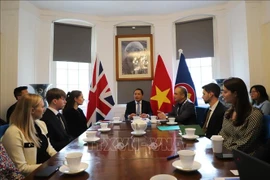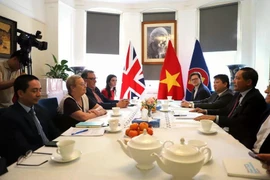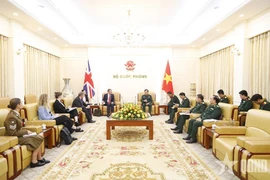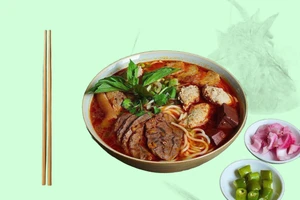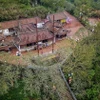Hanoi (VNA) - A delegation from 108 Military Central Hospital led by its Director - Major General, Professor, Dr Le Huu Song - concluded a productive working visit to the UK from June 10 to 13, advancing strategic medical partnerships with top UK institutions.
The delegation had discussions with the Royal College of Surgeons of England (RCS), the University of Cambridge School of Clinical Medicine, and the Vietnam–UK Business Association (VBUK), and met with medical experts from the University of Oxford.
At the RCS, a leading authority in surgical and dental training and accreditation, the delegation introduced 108 Military Central Hospital (Hospital 108) as one of Vietnam’s top-tier medical institutions, with the capacity to receive and implement advanced medical technologies from abroad. They explored opportunities in the RCS’s international surgical training programmes and its professional accreditation system.
Both sides discussed a proposal to establish a surgical training centre at the Vietnamese hospital based on the RCS model and agreed to set up a working group to move the project forward. Hospital 108 is already an official member of the RCS, meaning it meets the college’s standards for surgical training.
During the meeting, the RCS also awarded its membership certificate to Associate Professor, Dr Vu Ngoc Lam, Deputy Director of Hospital 108. This certification is granted only to candidates who successfully pass the RCS’s professional assessment.
At the University of Cambridge School of Clinical Medicine, both parties discussed collaborative opportunities in undergraduate and postgraduate education and medical research, including student exchange programmes. Hospital 108 expressed its intention to send young doctors to short- and long-term training courses at Cambridge and also welcomed Cambridge medical students to undertake clinical placements in Vietnam.
In a separate meeting with the VBUK, Major General Song and VBUK Chairman Hoang Viet Phuong signed a memorandum of understanding to strengthen cooperation in technology transfer, healthcare services, hospital management, medical tourism, aesthetic services, and internship and research opportunities at Hospital 108 for Vietnamese expatriate students pursuing medical studies.
Speaking to the Vietnam News Agency (VNA) correspondents in the UK, Song described the visit as a success, yielding encouraging outcomes and opening up promising prospects for collaboration with the UK’s prestigious medical education and training institutions.
He noted that as part of its strategic vision, Hospital 108 aims to become a centre for technological transfer, adopting at least three to five new medical techniques from abroad each year. In this regard, partnerships with UK medical organisations are of critical importance and provide significant benefits, not just to Hospital 108 but to Vietnam’s broader healthcare system.
He added that the establishment of a surgical training centre modelled on the RCS at Hospital 108 will help standardise the qualifications of Vietnamese surgeons, ensuring their training and certification aligns with international standards. Meanwhile, cooperation with the University of Cambridge will allow young Vietnamese doctors to train at one of the world’s most prestigious medical institutions, while enhancing joint scientific research and student exchange initiatives.
He also expressed his hope that the partnership with the VBUK will open a new channel for connecting with British healthcare partners and offer the Vietnamese community more options for high-quality medical and aesthetic services in their home country through the hospital’s “Healthy and Beautiful Homeland” programme. Hospital 108 is both a leading national healthcare institution and a top aesthetic centre in Vietnam./.

See more
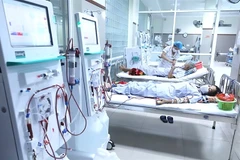
Vietnam sees alarming surge in diabetes cases, over half undiagnosed
An estimated 7 million Vietnamese are currently living with diabetes, but about 50% remain undiagnosed, a dangerous gap that is fuelling serious, preventable complications and increasing the burden on the healthcare system.
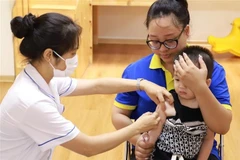
WHO, UNICEF commend Vietnam’s progress in childhood immunisation
In 2024, Vietnam achieved 99% coverage for the first dose of the diphtheria, tetanus and pertussis vaccine, up from 80% in 2023. Immunisation coverage in the country has not only rebounded to the high levels seen before the COVID-19 pandemic but has now surpassed the rates recorded in 2019.
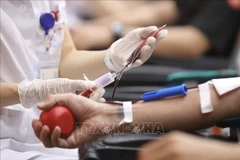
Hanoi blood donation campaign sets to collect 4,000 units of blood
The organisers hope the drive will help boost emergency and treatment blood supplies during summer—a time when donations often decline sharply.
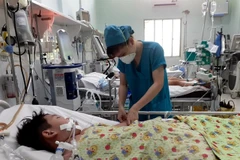
HCM City reports six dengue deaths, raises outbreak alert
Health authorities in HCM City have issued an urgent alert after six people died from dengue fever, amid a spike in infections driven by the onset of the rainy season.
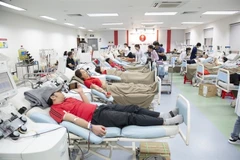
Health sector calls on people to donate blood
During the peak months of July and August 2025, the National Institute of Haematology and Blood Transfusion (NIHBT) needs at least 90,000 units of blood to supply 180 hospitals in the northern region. However, despite continuous efforts, the reserve blood is still short of 30,000 units.
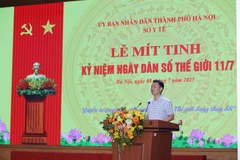
Hanoi celebrates World Population Day
The Hanoi ceremony highlighted efforts to ensure all citizens, especially women and youth, can access accurate information and healthcare services to make informed reproductive choices.
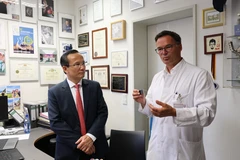
Vietnam, Germany forge cardiovascular partnership
Currently, cardiovascular specialists from the 108 Military Central Hospital are working alongside a team of Prof.Dr. Jan D. Schmitto, Deputy Director of MHH’s Department of Cardiac, Thoracic, Transplantation and Vascular Surgery on clinical trials for MCS devices, implanted in heart failure patients either as a bridge to transplantation or as permanent treatment.
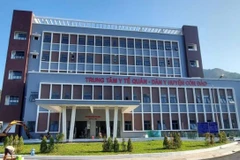
HCM City seeks to build general hospital on Con Dao Island
The centre not only serves residents living on the island, but also receives tens of thousands of visitors every year, according to Assoc Prof Dr Tang Chi Thuong, Director of the HCM CIty Department of Health.
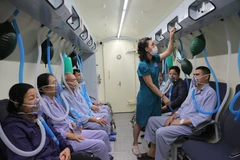
Vietnam – attractive destination for medical tourism
Not only does Vietnam attract international tourists with its landscapes, culture, and cuisine, but it is also gradually becoming a reliable destination for medical treatment, offering high-quality services at reasonable costs.
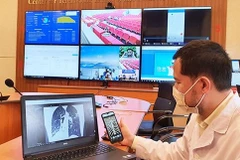
Vietnam looks to expand telehealth to improve access for remote communities
Over the past six months, 150 communal health stations in provinces including Ha Giang, Bac Kan, Lang Son, Lao Cai, Lai Chau, Yen Bai, Tay Ninh, Hau Giang, Ben Tre and Ca Mau have been equipped with information technology systems. In addition, 117 key provincial healthcare workers have received training, with thousands more expected to follow.
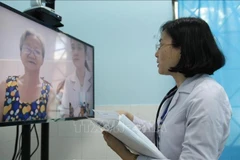
Vietnam, RoK strengthen cooperation in telemedicine
During the COVID-19 pandemic in 2020, the Ministry of Health swiftly launched a telemedicine programme, connecting more than 1,000 medical establishments nationwide. The model, which remains in operation, has benefited tens of thousands of patients, including foreign nationals.
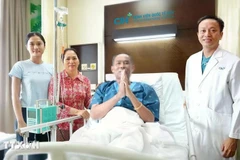
HCM City doctors revive Cambodian infected with “flesh-eating” bacteria
After more than three weeks of intensive treatment, the patient's pneumonia improved, breathing stabilised, sedation was reduced, and the breathing tube was removed. He is now conscious, able to eat orally, and in recovery.
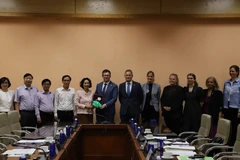
Vietnam, Denmark launch phase 3 of strategic health sector partnership
Vietnam is currently reshaping its grassroots healthcare system to better serve a rapidly ageing population, address changing disease burdens, and meet rising public expectations fuelled by economic growth.

Vietnam joins 110 countries in taxing to raise unhealthy products’ prices
The press awards on non-communicable disease prevention, launched on April 28, received enthusiastic participation from journalists across various media outlets, with over 120 entries submitted.
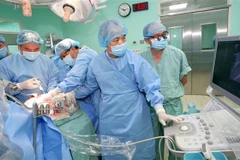
Hue Central Hospital successfully performs four simultaneous organ transplants
Despite storm-related disruptions and flight delays, the organs were successfully transported via a combination of air and ground travel. All patients are currently stable and recovering well.
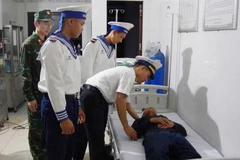
Injured fisherman in Truong Sa receives timely medical operation
The patient, Tieu Viet But, born in 1970 and residing in Binh Tri commune, Binh Son district, the central province of Quang Ngai, was working aboard fishing vessel Qng – 95657TS when the incident occurred at 7:00 am.
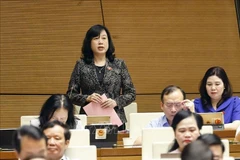
No counterfeit drugs in hospitals: Health Minister
All drugs entering hospitals must have a clear origin, so counterfeit drugs are only in the market, not in hospital, affirmed Minister of Health Dao Hong Lan.
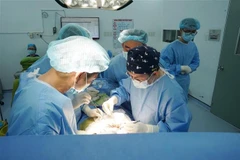
Brain-dead man's organs save seven lives in Vietnam
Thong Nhat Hospital in Ho Chi Minh City announced on June 16 that the transplants were successfully performed using the man’s donated organs.
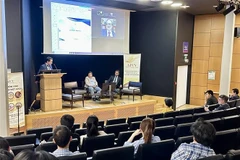
Forum spotlights AI and digital innovation in healthcare
To achieve its goal of becoming a developed nation by 2045, Vietnam is prioritising the integration of AI and digital tools into the training of future doctors, said Assoc. Prof. Dr. Nguyen Viet Nhung, Dean of Medicine at University of Medicine and Pharmacy, Vietnam National University (VNU) Hanoi.

Experts call for joint efforts and integrated disease prevention to end dengue deaths
Health experts called for collective disease prevention and integrated solutions to achieve zero dengue deaths in the country at an online talk show on June 14.
